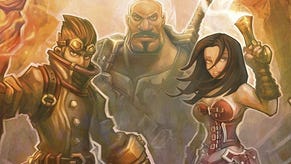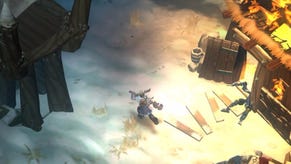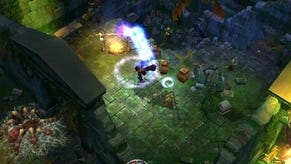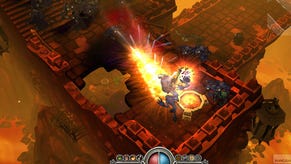Torchlight
It's all in the mine.
"What we've come up with is making larger sections of games than we used to. A whole level will be broken down into eight big chunks, and we make several versions of each room so the game can randomly lay it out. But we're still able to architect specific elements within that. It means you can have really well-scripted events with secret rooms and levers and puzzles, while still retaining the randomisation that keeps it fresh. And even within scripted parts, you can set up random things, so that half the time a particular shrine will appear and half the time it won't."
Naturally, the monsters and drops within the dungeons will also be randomised. "The loot game is so deep on this," Schaefer says, practically giggling with happiness. "We've got set items, magic items, unique items, socketed items, you name it. And we got a lot of experience on Diablo - and Hellgate, to a certain extent - on making the most of monsters, too. They can wield weapons, and they'll feel different to fight as various combinations come together. We've just got really efficient at making this stuff."
Torchlight is a beautiful game to watch: its mines are spangly turquoise grottoes one minute, and sulphur-choked underground fortresses the next. The colours are bright and sharp, and the game has a cartoon look that will presumably scale well, while managing to incorporate elements from dark fantasy, frontier culture, and even a touch of steampunk. It's an aesthetic that should quickly draw a community in, and once they're there, Runic hopes they'll get to work themselves. "We're shipping the development tools with the game," says Schaefer. "You can do that with single-player titles, because who cares if they hack it? We're hoping that the modding community goes crazy. There are a lot of really sharp guys out there - they'll do some cool things we've never thought of, and hopefully build a lot of content."
While the community's working on DLC, then, the Torchlight team will be busy on the MMO. Developed in partnership with the Chinese company Perfect World, Torchlight's online incarnation will follow the free-to-play model, supporting itself with virtual asset purchases. In Asia, this is steadily becoming an exact science, and Runic's plan seems solid and safe - selling you items that lean towards customisation and convenience rather than anything which would give you an unfair advantage against players who aren't spending money.
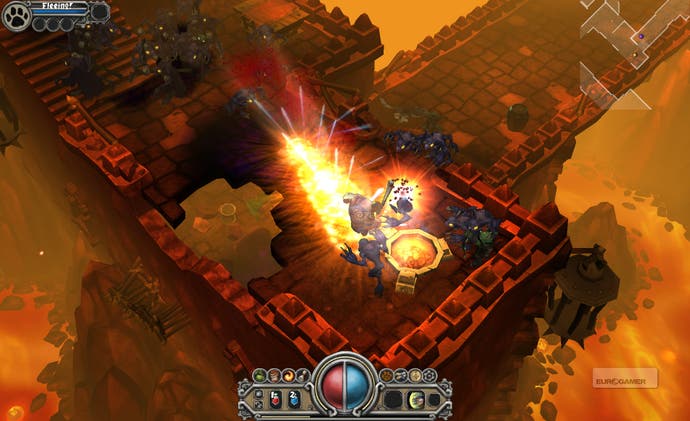
The team wants to retain Torchlight's accessibility as it moves online. "We want to be the MMO you don't have to devote your life to necessarily," says Schaefer. "You can go in, play for thirty minutes, achieve something, and then go make your dinner reservation." While it's nice to think that Schaefer sees gamers as a group of people with a regular table at the Four Seasons, and perhaps a box at the ballet, too, there will inevitably be a slight shift in approach as a single-player experience transforms to incorporate a large population. "We'll have a more traditional MMO structure than the single-player game," Schaefer continues. "We'll have a shared over-world, and lots of social features like guilds. We'll still do instanced dungeons as well as shared dungeons, though, both soloable and party-play. A lot of MMO players like to solo anyway, so it will be very solo-friendly, but we'll also have raid content and stuff like that."
Schaefer confirms that some of the randomisation will survive, too. "We can do that within instanced dungeons in an MMO, but we do want to have an expansive shared overland where you can walk from one area to another." He grins, pointing back to one of Runic's dozens of HD screens. "What we really want to do is bring this gameplay style, the camera angle, the feel of it, the action, the speed, and layer that into traditional MMO elements with its guild chat and buddy lists. No-one's really done it yet."
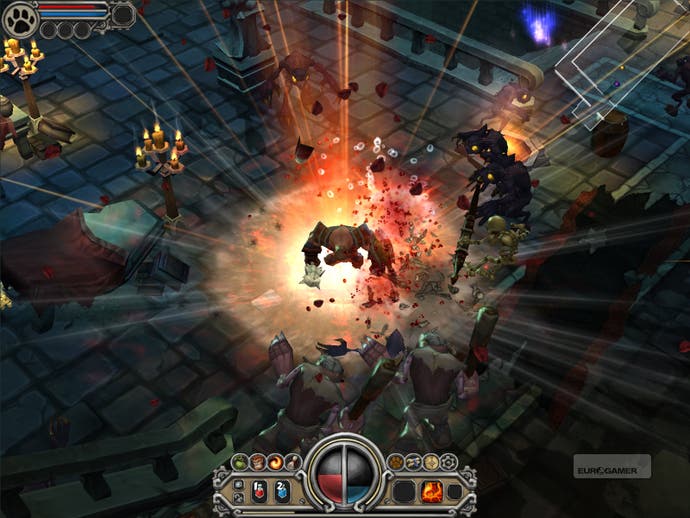
It's a very level-headed strategy, then, and there's every reason to hope Runic will be successful. Stuck in between behemoths, it's very easy to root for such a lean, smart development team and their friendly take on game design. That's not to say it isn't scary times for anybody in the Diabloesque business at the moment, what with Blizzard gearing up for their third instalment.
Typically, however, Schaefer seems rather cheery at the prospect. "If you stand on your toes, you can actually see the Diablo III booth from here," he says, gesturing across the PAX floor. "We're still good friends with the Blizzard guys - there was no animosity with our leaving. We can't wait for Diablo III to come out either, and, there's something really satisfying about someone else doing the work this time. I can just be a game fan and enjoy it. We're going in a separate direction with Torchlight, anyway: we're doing a single-player game, and then we're going to do a true MMO. They're going down the middle and doing Battle.net session-based play."
He smiles again. In fact, he's been beaming for the whole half hour I've been with him, and probably for the last few days as he's been showing people his game. "It's all good, really. Even with both of us out there, the action RPG genre is still under-represented, if you ask me."
Single-player Torchlight is released as a direct download for PC on 27th October, priced at US$19.99. More info at the official Torchlight website.


